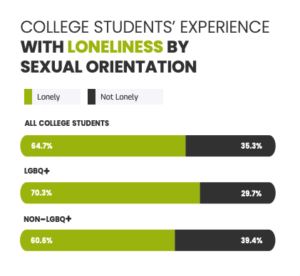Table of Contents
College is a pivotal time of self-discovery; however, the transition into higher education is a major life upheaval, and one that leaves some students struggling to navigate. For many, it’s the first time living away from home, navigating an entirely new social landscape and coping with academic pressures independently. All of these changes, coupled with the pressure to perform academically, be financially stable and future-focused, often exacerbate anxiety, depression and stress.
Navigating mental health challenges in a new, high-pressure setting can also lead to what has been deemed a growing epidemic: loneliness. U.S. Surgeon General Vivek Murthy called loneliness a public health epidemic in 2023. While loneliness and isolation is affecting society at large, college-age people are especially feeling alone. A survey by the Cigna Group found that 79% of adults aged 18 to 24 report feeling lonely compared to 41% of seniors aged 66 and older.
According to an Active Minds and TimelyCare survey of nearly 1,100 college and university students in February 2024, college students who report feeling lonely are more than four times more likely to experience psychological distress. Additionally, about three in ten college students report severe psychological distress as measured by the Kessler K6 psychological distress scale. This includes things like feeling everything’s an effort, feeling nervous, feeling restless or fidgety, feeling hopeless, worthless, or so sad like nothing could cheer them up.
The loneliness prevails
A Gallup poll found that more than one-third of students felt lonely or sad the previous day, and that loneliness was something they reported feeling even more than sadness or anger.
Despite being surrounded by peers, the shift away from familiar environments and support systems into a new setting can leave students feeling isolated.
Social media
While a tool for staying connected, social media can exacerbate feelings of loneliness and inadequacy as students compare their experiences to the seemingly perfect lives of others.
Dr. Jon Dooley, vice president for student life, and Emma Bach, student, of Elon University talk about how social media can affect student mental health.
Surface-level interactions
College life is bustling with activity, but much of it consists of fleeting interactions that don’t necessarily foster deep connections. Students may feel pressure to appear socially active, yet feel deeply alone despite being surrounded by people.
Academic pressure
The intense focus on academic achievement can limit the time and energy students have for social activities, further isolating them.
Lack of belonging
The new data by Active Minds and TimelyCare suggests feelings of loneliness and isolation are particularly challenging for LGBQ+ college students, 70% of whom identified as lonely, compared to 61% of their non-LGBQ+ peers.
Active Minds and TimelyCare’s survey further found nearly two-thirds of all college students identified as lonely, with 28% feeling isolated from others, 23% feeling left out and 21% lacking companionship.
Transform Your Campus With Virtual Care
A campus-wide call to action
Address the epidemic of loneliness, especially for LGBQ+ students
Loneliness is one of the top predictors of psychological distress and negative mental health outcomes. With many college students continuing to experience loneliness and its predictive relationship on psychological distress, colleges and universities are uniquely positioned to support and address student mental health needs.
 LGBQ+ students may have an increased likelihood of experiencing loneliness. The Active Minds and TimelyCare survey found LGBQ+ college students are more likely to experience loneliness than their non-LGBQ+ peers, with 70% identifying as lonely. Among LBGQ+ college students, 34% feel like they are often isolated from others, 27% often feel left out and 23% feel like they often lack companionship.
LGBQ+ students may have an increased likelihood of experiencing loneliness. The Active Minds and TimelyCare survey found LGBQ+ college students are more likely to experience loneliness than their non-LGBQ+ peers, with 70% identifying as lonely. Among LBGQ+ college students, 34% feel like they are often isolated from others, 27% often feel left out and 23% feel like they often lack companionship.
However, those with family and friend support, greater shared concern about mental health and more positive perceptions of how their college or university values and prioritizes mental health may experience greater connection and less loneliness. Colleges and universities can work to improve the protective factors to reduce loneliness for LGBQ+ students.
Facilitating connection and creating in-person or virtual spaces, for all students, especially for LGBQ+ students, to establish relationships with others may be beneficial for the individual, their friends, and their peers at large.
Tailor mental health resources to students’ needs and identities
Since having good mental health is important to college students, there are many opportunities to build, expand, and grow campus-wide programs, initiatives, and policies to support student mental health. Currently, many mental health programs are created to address mental health concerns at the individual level, such as in-person and virtual counseling services, online self-help programs, and campus self-care events, and these initiatives continue to be valuable.
S. Christian Jackson, director of counseling & self-development at South Carolina State University, said by going to spaces where students already are – like college coffee events or being active and engaging on social media – her team has been able to better tailor resources to fit their specific needs.
“It’s an interdisciplinary type of approach that we take at State, and that includes starting with the students,” she said. “We always say, ‘your counseling center is built for you, by you.’ We really want them to know they’re involved and that we want to listen in as much as we can to make sure that we execute what they want to see.”
With more Black and Latino/a/e college students prioritizing and caring for their own mental health, tailoring services is necessary to ensure their mental health needs are met and they feel supported when engaging with campus mental health services and offerings. For example, ensuring access to mental health providers who identify as people of color, speak multiple languages, and reflect students’ lived identities may make students feel more comfortable seeking support.
There is an opportunity to further explore why fewer Latino/a/e college students feel that other students at their college or university are concerned about mental health.
Equip students with skills to support each other
College students are interested and willing to support their friends and help them take care of their mental health, and we know peer support is the #1 way students seek mental health support.
Programs aimed at the interpersonal level, such as formal or informal peer support programs, emotional literacy programs, peer coaching programs, and virtual peer communities, may help students gain the knowledge and skills to adequately support their friends without feeling like they have to be an expert to help.
Maddie Kerr, co-president of the Active Minds chapter at Northwestern University, said the campus health promotion and wellness center offers free mental health first aid training for students to learn how to offer direct, concrete support to peers who may be struggling with mental health or substance use.
“Programs like this are really beneficial because students can get super in-depth and evidence-based strategies from health professionals, and I think that can definitely increase students’ confidence within their interactions with their peers,” they said.
TimelyCare’s peer community and self-care journeys are examples of alternative and important ways the platform provides space for students to interact with each other. In 2023, students engaged in nearly a million interactions with the self-care journeys and in the peer community.
Since the survey found LGBQ+ college students are more concerned and more interested in helping their friends take care of their mental health than their non-LGBQ+ peers, they may be able to serve as peer supporters or advocates to work with others to improve their mental health.
For students attending two-year colleges, there is an opportunity to build programming designed to start conversations and talk openly about mental health. Because of the commuter nature of two-year colleges, students attending these schools may spend less time engaging in campus activities than their four-year college counterparts. Therefore, embedding mental health in existing programming, creating awareness events, providing virtual services, and sharing the impact of mental health on the campus may be beneficial.
Encourage student voices and advocacy in decision-making
Creating intentional spaces and programs to support mental well-being on campus is not just a responsibility of administrators, but a vital investment in the academic and personal success of students. Students can be and are fundamental drivers of change.
The Active Minds and TimelyCare study also found that while two-thirds (63%) of college students believe mental health is an important campus issue, only half (50%) believe that students actively identify mental health challenges, brainstorm shared solutions, and collaborate with other students and organizations to work together to improve mental health on their college campuses.
Speaking in a recent webinar, Kerr said the student voice is paramount to understanding the unique needs of the campus community. For example, as a member of student government, Kerr said the group strongly advocated for bringing TimelyCare to their campus.
“On one hand, it was really, really exciting to see students identify this unmet need for services and make this very concrete proposal to partner with TimelyCare, then to have our administration be super receptive to that,” they said.
Kerr emphasized the importance of engaging students even beyond the typical campus leadership groups, saying mental health is not one-size-fits all.
Maddie Kerr, student at Northwestern University, talks about the importance of supporting students with different life experiences, identities and circumstances.
“Our life experiences, our multiple identities and our current circumstances all shape our unique mental health-related needs,” Kerr said. “Administrators should make sure that they’re intentionally having conversations with a variety of campus communities that might be facing particular sources of distress and particular barriers to support.”
Survey data found that there is a strong positive correlation between being concerned about their friends’ mental health and helping their friends take care of their mental health, with more than half (52%) of college students concerned about their friends’ mental health. Additionally, more than half (54%) of college students shared that taking care of their mental health informs their decisions guiding their behavior and actions.
Kerr said they were struck by these findings.
“It’s definitely something that resonates with what I’m seeing as a current college student and as someone who is pretty involved in mental health spaces on campus,” they said. “Especially in my generation, we have made a lot of strides toward mental health awareness and opening up the conversation. I think what this data supports is that students are looking for action around mental health, too, not just awareness. We want a deeper sense of community and authentic connection, but we need support in creating the spaces to achieve that.”
The benefits of supporting college student mental health are clear for students, colleges and universities, and society. College students who feel supported, connected and have access to mental health care they need are more likely to graduate and experience better mental health outcomes while on campus and in the future.
Learn how you can support student success and well-being on your campus through a TimelyCare partnership.






